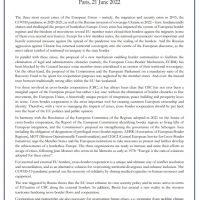Cross-border territories: fatalism or resilience?
Knowledge sharing | 28 June 2022
Knowledge sharing | 28 June 2022
In cooperation with the European Committee of the Regions and the European Commission, under the umbrella of the French Presidency of the EU, the Mission Opérationnelle Transfrontalière (MOT) organised the pan-European Borders Forum second time. The event, attracting approximately 150 experts in person and the same size of online audience took place in the International University of Paris, on 21 and 22 June 2022.
The speakers of the 13 round-table panels discussed the topics relating to the borders and cross-border cooperation in a comprehensive way, from the common management of resources and energy, to cross-border public services and governance, including also the youngsters. The participants were greeted by Mr Christian Dupessey, the president of MOT who invited to the stage Ms Zsuzsanna Fejes, president of CESCI and Mr Karl-Heinz Lambertz, president of AEBR. The three leaders highlighted their willingness to unite their forces in order to facilitate eased cross-border permeability within the EU and protect the achievements delivered so far. The political declaration of the three associations was also available among the documents and brochures distributed during the conference.
The speakers participated in round-table discussions moderated by media professional instead of conference presentations. This model enabled them to express and confront their opinion resulting in lively discussions involving also the audience who were informed about innovative solutions like the Regional Green Deal of the Occitan region, the increasing utilisation of hydrogen along the Dutch-German border, the tax-reimbursement from Geneva canton to the partly French neighbourhood from where the workers are commuting to the Swiss city, the joint public transport ticketing system at the Czech-Polish-German tri-border area, the cross-border urban development plan of the Tri-national Eurodistrict of Basel and the cultural and linguistic projects of the Trans-Pyrenean Youth Forum.
The speakers also drew the attention to the dramatically negative impacts of the closure of the borders during the pandemic, the Brexit, the re-nationalisation (de-globalisation) of the economic life, the increasing significance of securitisation of the borders.
At the closing panel of the event, professor Emmanuel Brunet-Jailly (University of Victoria) called the European institutions and the national authorities to tackle border areas in compliance with their ‘critical mass’, meaning that 40% of the soil of the EU are border areas, while 37% percent of the total population live there. Marc Lemaître, director general of the DG Regio highlighted that these regions had profited the most from the European integration, consequently, they are the most interested parties in its protection. Mr Petr Blizkovsky, secretary general of the Committee of the Regions underlined the necessity of civic participation as these are the citizens who confront the shortages of the European integration in their everyday lives, therefor, they own the proper knowledge for identifying the solutions.
The rich debate is continuing in 2024 with the 3rd edition of the Borders Forum.

 To put cross-border cooperation back into the heart of the European project....
To put cross-border cooperation back into the heart of the European project....